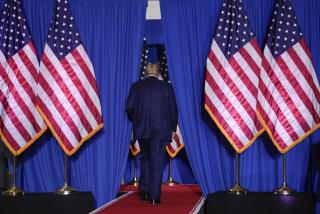Op-Ed: Trump can’t executive-order it away: Twitter itself called him a liar

This week in weird but inevitable showdowns: The sphinx Jack Dorsey vs. the vulgarian Donald Trump.
Two events prompted the showdown. First, on May 21, Dorsey was contacted by a widower, Timothy Klausutis, whose life had been turned upside down by Trump’s tweets. Klausutis asked the co-founder and CEO of Twitter to delete two of the president’s tweets, the ones peddling “falsehoods, half-truths, innuendo and conspiracy theories” about the death of Klausutis’ wife, Lori, in 2001.
Trump’s actions in this case are almost too obscene to review. In short, the president, whose unraveled brain will clearly never re-ravel, has been wantonly insinuating on Twitter that Joe Scarborough, once a Republican House member from Florida, now a Trump critic and MSNBC host, killed Lori.
In fact, Lori Klausutis, then a 28-year-old staffer in Scarborough’s home district office, died in a well-documented accident. She fainted and hit her head. No mystery, no lingering doubts, no need for further investigation, according to the coroner.
On Wednesday, at Twitter’s annual meeting, a shareholder asked Dorsey whether the platform would remove Trump’s offensive tweets. Dorsey refused in what looked to many like heartlessness.
Mitch McConnell is holding stimulus legislation hostage to keep businesses from paying for potentially culpable conduct during the pandemic.
Instead, Twitter released a corporate statement, at once banal and portentous, offering condolences to Klausutis, adding: “We’ve been working to expand existing product features and policies so we can more effectively address things like this going forward, and we hope to have those changes in place shortly.”
The second reason for the Dorsey-Trump confrontation is that, one day before he refused Klausutis’ request, Dorsey had taken a completely different tack with Trump. Known as a spiritual seeker, Dorsey may be a guy for whom an apparent inconsistency is an expression of freedom and imagination.
In an unprecedented move, Dorsey affixed an editorial note to a pair of Trump’s tweets. “Get the facts,” it said, linking to a bulleted list of statements that dismantled the president’s latest conspiracy claims about mail-in ballots.
Dorsey later explained the links by citing Twitter’s new “civic integrity policy”: Twitter’s services can’t be used “for the purpose of manipulating or interfering in elections or other civic processes.”
Though some malcontents called Dorsey’s move too little, too late and too ambiguous, it was a shock to the social media system. Twitter, not merely individual tweeters, had called the president of the United States a liar.
In rolled Trump, on cue, hopping mad. First, he labeled the fact-checking sources fake news, then he claimed Twitter was stifling freedom of speech. On Thursday, the White House issued a bonkers executive order supposedly designed to smack down social media using a Federal Communications Commission cudgel. A lot of legal analysts, including Robert McDowell, a former Republican commissioner at the FCC, scoffed at it. On Twitter, of course, he wrote: “This is #unconstitutional.”
Most Republican officeholders, however, stood silent, as usual, even in the face of Trump’s violation of their central piety: that government should stay out of private enterprise. A president saying he’ll shut down some of the biggest tech companies in America? Ronald Reagan must be rolling in his …
Never mind. No grave rolling is going to matter to gonzo Trumpites now.
Elsewhere this week, two of Trump’s blondest surrogates — advisor Kellyanne Conway and White House Press Secretary Kaleigh McEnany — bobbed and weaved on the Twitter matter.
Conway on Fox TV Wednesday directed trolls to a Twitter exec, carefully spelling out his Twitter handle to viewers and warning he’d wake up to thousands of new followers.
McEnany from her perch in the briefing room went one step further — actually, what is “further” for these people? — ignoring facts with flight-attendant cheer and a train load of snitty “whataboutisms.” She claimed Scarborough had laughed on the radio about Lori’s death — he did not — as a way to shift blame to Morning Joe for the widower’s pain. She would not address Timothy Klausutis’ request that the president’s conspiracy-mongering stop so his family could have some peace.
The vulgarity and cruelty could make a person choke. Meanwhile, the sphinx didn’t choke.
Maybe his attention is elsewhere. Dorsey is a bit of a mystic. He once likened social networks to colonies of aspen trees (“if one of them dies, they all suffer”). He fasts rigorously and attends meditation retreats. In early April, he set up a fund to fight COVID-19, seeded with $1 billion, just over a quarter of his fortune. On Tuesday, he gave another $10 million to needy families touched by the pandemic.
Mark Zuckerberg of Facebook, who was recently exposed in the Wall Street Journal as indifferent to his company’s role in civic life, criticized Dorsey’s move to brand some of Trump’s tweets as deceptive. He spouted the shopworn stuff about how he didn’t want to be an “arbiter of truth.”
The sphinx still didn’t choke. Instead, Wednesday night he tweeted that offering facts alongside Trump’s tweets is hardly truth arbitration; it’s transparency squarely in the public interest: “Our intention is to connect the dots of conflicting statements and show the information in dispute so people can judge for themselves.”
On a retreat in Myanmar in 2018, Dorsey sat meditating on concrete for 17 hours while mosquitoes gnawed on his legs. My guess is he’ll have no trouble riding out the bites of White House mosquitoes.
The dog barks; the caravan passes. The vulgarian yapped, the sphinx won this round.
More to Read
A cure for the common opinion
Get thought-provoking perspectives with our weekly newsletter.
You may occasionally receive promotional content from the Los Angeles Times.











